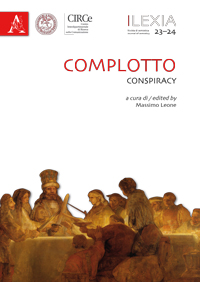Estratto da
LEXIA. RIVISTA DI SEMIOTICA
Complotto
Conspiracy as Politics of Historical Knowledge. Italian Terrorisms and the Case of Romanzo di una strage. Piazza Fontana: The Italian Conspiracy
LEXIA. RIVISTA DI SEMIOTICA
Complotto
Conspiracy as Politics of Historical Knowledge. Italian Terrorisms and the Case of Romanzo di una strage. Piazza Fontana: The Italian Conspiracy

The article explores conspiracy theories through the interpretative category of the “politics of knowledge”. It argues that conspiracy theories can play the role of a form of knowledge construction for dealing with past historical events and have as their reverse particular forms of ignorance (in particular, secret). The article draws on a semiotic perspective on conspiracy—in particular, on Umberto Eco’s and Jacques Rancière’s reflection on semiosis and knowledge—but departs from the pathologizing approach to conspiracy predominant in the literature. The case study of the article is the representation of Italian terrorisms in Italy — the so–called “years of lead” — and the conspiracy narratives that are used in the elaboration of the different “unknowns” related to them. By describing the different cultural responses to terrorist violence, the article places conspiracy in a broader cultural and historical context, in which the film Romanzo di una strage/Piazza Fontana: the Italian Conspiracy (Marco Tullio Giordana, 2012) is analyzed as one of the most recent examples of conspiracy narratives. By representing the piazza Fontana bombing and “stragismo” as the result of a very complex conspiracy, the film exculpates the Italian society at large from any responsibility as regards the violence that marked the 1970s; through the three protagonists, (Luigi Calabresi, Aldo Moro, and Giuseppe Pinelli), the movie puts the audience and its different political and memory constituencies in the position of victims.
| pagine: | 209-223 |
| DOI: | 10.4399/978885489931512 |
| data pubblicazione: | Giugno 2016 |
| editore: | Aracne |








